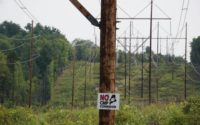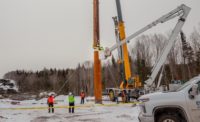Clean Energy Construction
Jury: $1B Hydropower Line in Maine Can Finish Construction

Photo: NECEC
In a key twist for a controversial $1-billion Maine transmission project set to carry hydroelectric power from Canada to New England, a state jury ruled unanimously on April 20 that the project developer had established "vested rights" to proceed with construction by completing enough physical work before voters blocked work in 2021.
The 145-mile New England Clean Energy Connect project, to be paid for by Massachusetts ratepayers, would supply up to 1,200 MW of Canadian hydropower to the New England power grid and is expected to lower electricity costs. The project is considered essential for the state to meet its large and aggressive plan to reach net zero greenhouse gas emissions in 2050.
Most of the transmission line would be built along existing utility corridors, but new construction of a 53-mile section in Maine was necessary to connect to Canada.
The jury decision in Maine's business and consumer court follows a state Supreme Judicial Court ruling last August holding that main parts of the state voter referendum held in November 2021 were unconstitutional because they denied the vested rights that project developer Avangrid had already established, with construction underway 10 months before the vote.
State high court Judge Michael Duddy opted to accept opponents' request to return the case to the lower court for a jury decision on the vesting issue. The verdict was reached after a two week jury trial in Portland, Maine. Jurors disagreed with project oppenents that Avangrid may have accelerated construction to build the case for vested rights. Among those challenging Avangrid was the state attorney general’s office, which is charged with upholding the referendum, which may be ruled unconstititional.
“The jury’s unanimous verdict affirms the prior rulings of the Maine Supreme Judicial Court that the New England Clean Energy Connect (NECEC) project may lawfully proceed," said Scott Mahoney, Avangrid senior vice president and general counsel, in a statement. "Even after repeated delays and the costs caused by the change in law, the project remains the best way to bring low-cost renewable energy to Maine and New England while removing millions of metric tons of carbon from our atmosphere each year.”
The decision will be appealed to the Supreme Judicial Court for the final say. That court last November
upheld a lease for a 1-mile portion of the proposed power line that crossed state land.
No Project Restart Date Aired
Neither Mahoney nor an Avangrid spokesperson provided detail as to when the project will resume construction, and to what extent the legal limbo had increased project cost. Last year, NECEC expressed concern about “an approaching tipping point” after which project completion would be at risk financially.
In comments to investors on April 26, Avangrid CEO Jose Azagra and other firm executives said that they probably would not know the new work schedule until mid-year.
Construction began in early 2021 and to date is expected to finish by the second quarter of this year. Contractors Cianbro Corp. and Irby Construction had been involved in corridor widening and were set to build a $250-million converter station in Lewiston, Maine that will convert direct current into alternating current to feed into the electric grid, Avangrid said previously.
"The teams will go back and evaluate where things stand and make a decision," Avangrid Senior Vice President Kim Harriman said in comments to the Portland Press Herald.
The company said in court documents it had spent $450 million, 43% of the total project cost estimate by November 2021 before the referendum passed, thereby establishing its vested rights. That included work by Avangrid subsidiary Central Maine Power in clearing 124 miles of right-away along the corridor, mostly for direct and alternating current lines and installation of 124 structures to support them.
Rebecca Tepper, secretary for the Massachusetts Executive Office of Energy and Environmental Affairs, said the verdict is a "critical step in moving Massachusetts forward to securing more affordable, reliable and clean energy for residents, businesses, and communities across the entire Commonwealth.”
Anne George, vice president at ISO New England, said she was “pleased” the jury decision would allow the project to proceed. “The New England states’ ambitious climate goals will require building significant amounts of new infrastructure in a region where building infrastructure has been difficult.”
But Sandi Howard, director of Say No to NECEC, a nonprofit opponent, says on the group's facebook page that “NECEC still faces legal challenges in state and federal court, including appeals of a permit granted by the Maine Dept. of Environmental Protection and the U.S. Army Corps of Engineers.
Parties in the state case include Natural Resources Council of Maine, NextEra Energy Resources and local residents in the Kennebec Valley called the West Forks Group. Opponents in the federal case, which dates to 2020, include the council, the Sierra Club and the Appalachian Mountain Club.
“Those permits on appeal could certainly trip it up,” said Beth Boepple, a Portland attorney who represents the West Forks group, including townships and property owners who oppose “forest fragmentation” and harm to wildlife.
Following the verdict, David Madore, deputy commissioner of the Maine Dept. of Environmental Protection said the agency is examining the decision’s potential impact on its order for Avangrid to suspend work. “The department is working to make a determination as soon as possible, he says.




